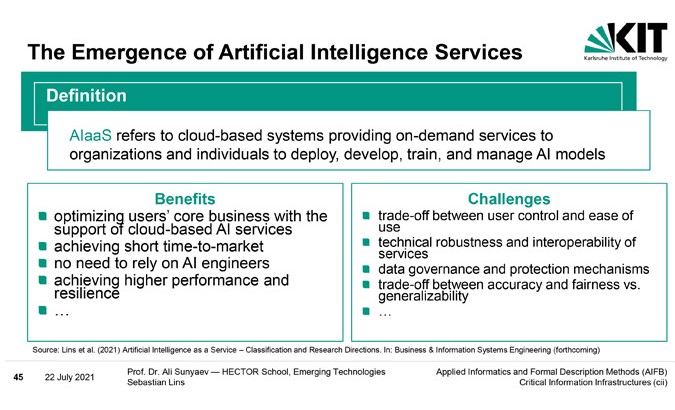Artificial Intelligence as a Service
Artificial Intelligence as a Service (AIaaS) is the term used to describe artificial intelligence (AI) from the cloud - one of the most innovative services currently available.
Artificial intelligence (AI) is currently an intensively discussed technology that offers promising possibilities for optimizing processes and relieving employees in a company. Companies are increasingly using AI to perform complex tasks that were previously thought to be the domain of humans alone. A major challenge for businesses, however, is the complex and demanding process of adopting and integrating AI, which still prevents most companies from adopting this forward-thinking technology and realizing its full potential.
To promote the spread and application of AI, several cloud providers have begun offering functions of AI, such as machine learning, deep learning, analytics, and inference, as a service. These services became known as Artificial Intelligence as a Service (AIaaS):
AIaaS refers to cloud-based systems that providing on-demand services to organizations and individuals to deploy, develop, train, and manage AI models.
by Lins et al. (2021): Artificial Intelligence as a Service - Classification and Research Direction
AIaaS aims to make AI accessible and affordable to all, guiding its users through the process of developing, deploying, or using data analytics models without having to learn complex algorithms or technologies. This is because one of the advantages of this technology is that it includes tools and resources that allow their development, operation, and maintenance.
Promising advantages of this technology are a shortened time-to-market by achieving increased performance and resilience. Of course, there are also disadvantages, such as the trade-off between user control and ease of use, and the often-critical handling of data security.
An illustrative example, for the potential use of AIaaS, is the development of an industrial quality control system based on images of a manufactured product: When the camera is active, it captures images and sends those images to an AIaaS that has computer vision capabilities to predict whether the product's condition is adequate or whether it has a defect. This way, the developers of the visual inspection system do not have to deal with the technical details of the underlying creation and implementation of the computer vision algorithm. Instead, the AIaaS provider makes specific hardware or configuration decisions that require the knowledge of AI experts.
The management modules of the Master of Science in Information Systems Engineering and Management address this promising technology: In EM4 "Emerging Technologies“, our students learn all the relevant about AIaaS from Prof. Sunyaev, who puts great emphasis on an interdisciplinary, conceptual and socio-technical perspective. Dr. Kühler teaches about the interaction of AI with service systems in EM5 Artificial Intelligence in Service Systems.
Source: Lins et al. (2021): Artificial Intelligence as a Service - Classification and Research Directions
https://link.springer.com/content/pdf/10.1007/s12599-021-00708-w.pdf


